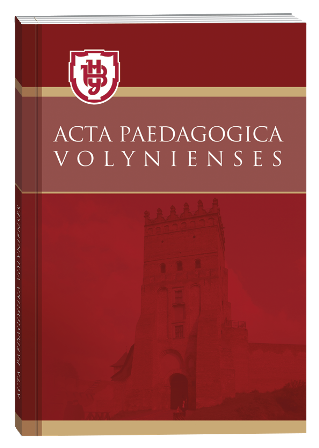CHARACTERIZATION OF CRITERIA AND INDICATORS FOR THE DEVELOPMENT OF AESTHETIC COMPETENCE OF FUTURE EDUCATORS OF PRESCHOOL EDUCATION INSTITUTIONS
DOI:
https://doi.org/10.32782/apv/2025.1.3Keywords:
criterion, indicator, aesthetic competence of future educators of preschool education institutionsAbstract
The article presents an analysis of the scientific achievements of domestic scientists, an understanding of the interpretation of the essence of the basic concepts of «criterion» and «indicator». The criteria for the development of aesthetic competence of future educators of preschool education institutions are characterized, namely: motivational, which implies the presence of a stable interest in aesthetic activity and awareness of its significance in the professional activities of future educators of preschool education institutions; personal, reflecting the development of emotional sensitivity, cognitive processes, aesthetic values and tastes; cognitive, which characterizes the level of knowledge on the basics of aesthetics, art, psychology and pedagogy and methods of their implementation in the educational process; activity, which includes the ability to apply psychological, pedagogical, methodological and special skills that are necessary in working with children and creating a favorable aesthetic and developmental environment; reflective, which implies the ability to analyze and evaluate one’s own aesthetic activity and mutual assessment of the levels of development of aesthetic competence of future educators of preschool education institutions, as well as readiness for self-improvement in this direction throughout life. A number of іndicators for the development of aesthetic competence of future educators of preschool education institutions have been allocated, which are key guidelines for assessing the level of aesthetic competence of future educators and determining the ways of its further development in the process of professional training in a higher education institution. Further scientific research has been outlined regarding the creation of models for the development of aesthetic competence of future educators preschool education institutions in the context of distance learning, in particular through the introduction of interactive methods, online resources and technologies in the educational process, which ensure the effective implementation of educational tasks.
References
Аторіна В. М. Розвиток естетичної компетентності майбутніх вихователів закладів дошкільної освіти у фаховій підготовці : дис. … доктора філософії : 011 Оcвітні, педагогічні науки. Глухів. 2021. 314 с.
Великий тлумачний словник сучасною українською мовою. К., Ірпінь: ВТФ «Перун», 2005. 1440 с.
Жуйсюе Ч. Естетична компетентність майбутніх вихователів: філософсько-педагогічні аспекти. Молодь і ринок. 2022. № 6 (204).С. 176–182.
Загородня Л. П. Теоретичні і методичні засади підготовки магістрів до забезпечення якості освітнього про- цесу в закладі дошкільної освіти : автореф. дис. … д-ра пед. наук : 13.00.04. Глухів, 2020. 39 с.
Калаур С., Лупак Н., Генсерук Г., Бобик (Проців) Л., Баньковський А., Солонінка Т. Естетична компетентність майбутніх учителів як об’єкт науково-методичного аналізу. Молодь і ринок. 2022. № 6 (204). Р. 176–182.
Кідіна Л. М. Психолого-педагогічний супровід педагогічної практики майбутніх вихователів ДНЗ. Вісник післядипломної освіти : зб. наук. праць. Київ, 2010. Вип. 1 (14). Ч. 2. С. 183–189.
Руденька Т. М. Формування професійної компетентності майбутніх фахівців мистецьких спеціальностей засобами арт-педагогіки : автореф. дис. … канд. пед. наук : 13.00.04. Житомир, 2017. 20 с.
Шапаренко Х. А. Формування професійної компетентності майбутніх вихователів дошкільних навчальних закладів на засадах акмеологічного підходу : автореф. дис. ... канд. пед. наук : 13.00.04. Харків, 2008. 20 c.







